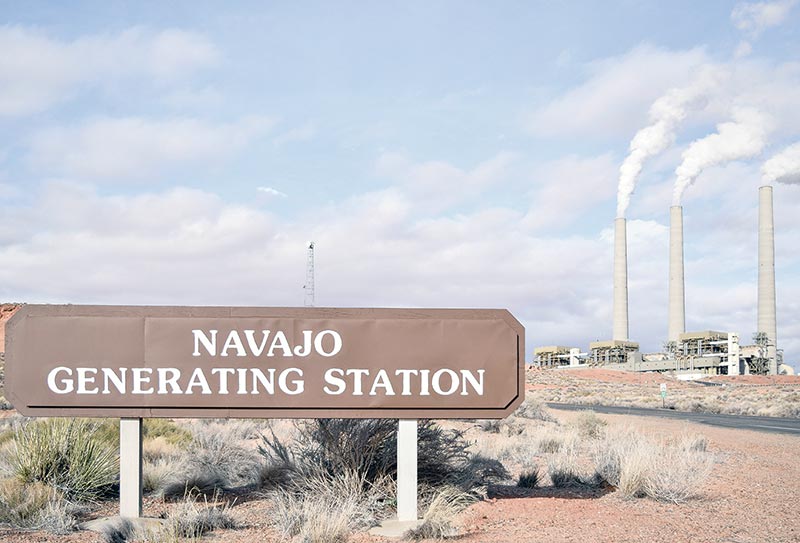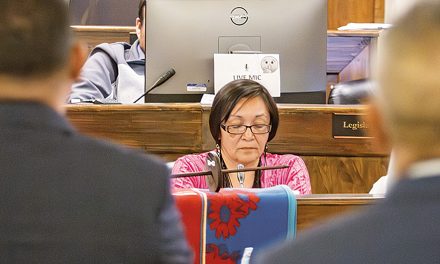
Letters: Nation is being pushed to make NGS decision

Navajo Times | Krista Allen The Navajo Generating Station near Page, Arizona, could shut down this year, taking more than 1,000 jobs with it.
Navajo Generating Station was the keystone of a 1960s plan to develop the coal of the Hopi and Navajo nations for the benefit of non-Indian people. Now that the plant is no longer economical for those same interests, they are telling the tribes they must hurry to come to an agreement on how the uneconomic coal plant will be retired.
We should not rush such as important moment in our nation’s future. This week the Navajo Nation Council will review the agreement reached by President Begaye. Before any agreement is signed, we must be sure that the plan provides a funded transition that preserves our ability to secure water rights, protects workers at the plant and mine, helps diversify our economy, cleans up the plant and mine, and repairs damage to our groundwater.
It will take money, especially in the first 10 years, to ensure workers and businesses do not lose out. We must be sure we will have adequate investments in new economic development and in cleaning up our land and water after decades of mining and burning coal.
We should be using the rush of the utilities to get out of Navajo Generating Station to drive the best bargain Ñ one that sets us up to get and use water rights too long denied us and to sell electricity from solar and wind to bring money to our nation.
It is possible that the utilities intended not to renew the lease for the plant but held off announcing that until they could present our government with a very fast timeline to make a very big decision.
The proposed agreement does not make it clear that the Navajo Nation asserts rights to all 50,000 acre-feet of water in the Upper Colorado River basin or that using a portion of that water under this agreement does not diminish that claim. It’s not clear what SRP’s commitment to support Navajo “use” of a portion of the 50,000 acre-feet per year actually means.
We don’t know what the overall economic development investments will be when the plant and mine close. What other commitments from the federal government or state of Arizona have been secured to complement those payments being made by the plant partners to the nation? What other commitments have been secured to assist with new jobs or future economic development? Have any individual partners made employment commitments to assist plant workers find new employment? Have the partners committed to making additional energy related or other investments on the reservation?
What are the risks and implications of the waiving of sovereign rights the Navajo Nation would make under this agreement? Are we certain the cleanup will be done appropriately? Will the nation take on any economic or public health or environmental risk under these waivers?
Managing a transition of this scale is a challenge. There should be an independent oversight commission that ensures the money is spent the way it should be and there should be independent audits to verify payments and valuations of assets.
These are just a few of the questions and concerns our elected officials should get answers to in order to ensure they win an agreement that benefits communities harmed by coal production and use and communities that need support in economic transition.
Let’s not let those who profited so much for two generations rush us to an incomplete agreement. Moments like this are rare, and we would be foolish to not push for a thorough plan for our nation. We must depend on our government to do this, and they need to hear from communities to ensure a good and just plan.
Jessica Keetso
Hardrock, Ariz.
NHA continuing the blame game
It may sound inappropriate but it sounds like the Navajo Housing Authority continues the blame game as I mentioned before in the Navajo Times recently. This time the blame is on articles by the Arizona Republic.
Clearly, the current problems with NHA are caused by its management, which is stretched back several years. As a result of these management problems the recent action by theÊNavajo Nation Council to swiftly remove the entire NHA Board of Commissioners was uncalled for and not the appropriate move.
The blame game needs to stop because the Trump administration is on a witch-hunt looking for every way to wipe out federal funding to clear the way for himself and his cronies, the wealthy folks. The social programs for the low-income Americans, including all the entitlement programs and any unspent federal funds from prior years are the targets.
What’s most disturbing is the report that NHA has hundreds of millions of dollars that currently sits in the bank unused. Also, it’s been all over the media in the last years that the Navajo Nation returns at least $40 million annually to the federal pot, which is bad news. These are easy targets for the Trump administration to shake lose.
The most troubling part is turning over the NHA operation to the Navajo Nation’s Division of Community Development as the tribally designated housing entity. They lack the expertise and may be worse with their spending pattern. They lost more than $3 million of the ‘638 Housing Improvement Program to other BIA region offices in the past decade. How can they justify taking the TDHE status?
In view of the above, the nation should privatize the housing organization under a single roof and create a one-stop operation rather than having programs scattered out. In reviewing recent tribal job listings there are a lot of positions that remain vacant for months and years. Why not convert them into a planning grant and hire some Navajo young bloods to head privatizing the housing organization.
Thank you for giving me this opportunity to address some problems and concerns.
Vern Charleston
Farmington, N.M.
Root of our problems is poverty
Of all Native American tribes, our Diné seem in denial of their poverty. Yet, 80 percent of Diné are directly or indirectly affected by the poverty of relatives and the social impact of poverty.
How can anyone not see that the root of all the destructive problems in our Diné Nation is poverty. How do we fix it? Certainly not more tribal or government programs.
The war on poverty, instituted by President Lyndon B. Johnson in the 60s, has made conditions worse among our Diné. Why? How about absent fathers for starters? The program guidelines for assistance only provide for single mothers. Families split so they can get the assistance needed.
We are told that the purpose for our existence as Diné is to walk in beauty and experience all the joy, happiness, confidence, and peace that can be experienced. However, it is impossible for our Diné to have those life experiences when they live in the suffocating grip of poverty.
Our Diné have sacrificed too much in their poverty. Gone are our economy of livestock, dignity of farming, family unity, and direction from leadership. The only things we have left to lose are our language, culture, history, and our identity.
As our Diné continue their existence in poverty, by 2030 there will be no Diné language, culture, or our history and few Diné will know their identity. Poverty can rob our Diné completely. Throughout history empires have collapsed upon losing their basic values and identity. We must not let this happen to Diné.
Today, 280,000 of our Diné would like to receive their rightful share of the $410 million of the mismanaged settlement money. This can easily be verified by placing the question on a referendum ballot, which is only right and lawful. Our elected leaders need to comprehend that this is only one way to address the poverty of our Diné.
That money, however, should not be dispensed without a compelling purpose. And the purpose would be the preservation of Diné culture. To receive a share of the settlement money a pledge would be signed. The pledge would state intent to participate in never allowing the loss of our Diné language and cultural teachings.
The lives of our Diné were intended to be filled with joyful harmony. As Diné we were never to be beggars on the doorsteps of our government. That $410 million rightfully belongs to our Diné and they should receive it for a compelling purpose.
When our Diné receive their money they can take comfort in knowing they have pledged their sacred trust and knowledge to future generations to preserving Diné culture.
Wally Brown
Page, Ariz.
A reunion to look forward to
You’ll never forget the vigil of sitting by your family’s bed as they spend their last few days with you and family before slipping into eternity.
To this day, the moment of their passing continues to have a profound effect on you. Your loved one was always there for you. You could call them whenever you needed counsel or what they need. You have great memories of your days together and you would talk about things.
You’re sitting there in your room, looking at your pictures of your loved one wondering why they couldn’t be a part of your future. Uncontrollable tears stream down your face, while your heartbeat starts to race.
Asking God why they were taken from your life. It was more painful than stabbing you in the heart with a knife. You still needed them here. (Saying) “You were the one to make everything so clear. You are a part of us and we are a part of you. When you died a part of us died too. We never knew how hard it was to lose someone you love until the day you went to heaven. Even though we can’t see you, we know you’re up there watching over us and your grandchildren. We miss you more and more each day and all we can do is pray. In our hearts you shall remain forever.”
But when your loved one took their last breath, you became aware of the irreversible finality of death. They are gone from this world. And in your heart, there is a vacancy sign hung on its door. Yet, even in the midst of such loss and grief, God’s word speaks encouragingly into the emptiness.
The apostle Paul teaches us that at the coming of the Lord Jesus Christ, those who have gone on before will rise first and we “shall be caught up together with themÉAnd thus we shall always be with the Lord” (l Thess. 4:17).
Now that’s a reunion you’ll really be looking forward to. Not only to be reunited with your family, but to be with Lord Jesus forever. “Christians never say goodbye.” We are all eagerly awaiting that ultimate reunion.
Who can comfort us when our loved one passes away? Our mourning continues in spite of all the kind words people may say. God hears and understands when we weep and mourn, but did you know death doesn’t exist when we are reborn? It doesn’t exist because we live under His grace. His sheep lives with Him forever in their new heavenly place.
Oh, how the angels rejoiced as your loved one walked through those pearly gates that day and what a happy reunion they had with Jesus who was waiting for them with open arms and their loved ones who were waiting.
Janet C. Etcitty/Bitah
Albuquerque, N.M.
To read the full article, pick up your copy of the Navajo Times at your nearest newsstand Thursday mornings!
Are you a digital subscriber? Read the most recent three weeks of stories by logging in to your online account.








 Highway 264,
Highway 264, I-40, WB @ Winslow
I-40, WB @ Winslow